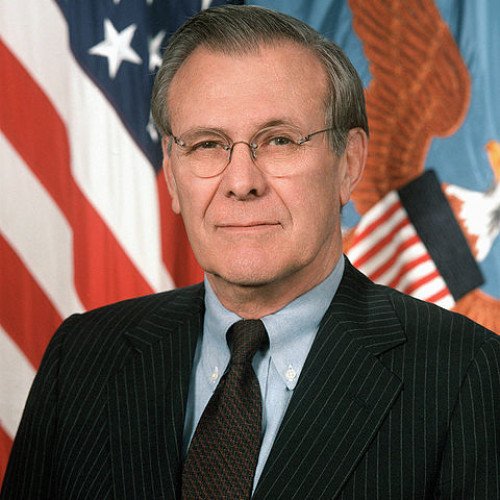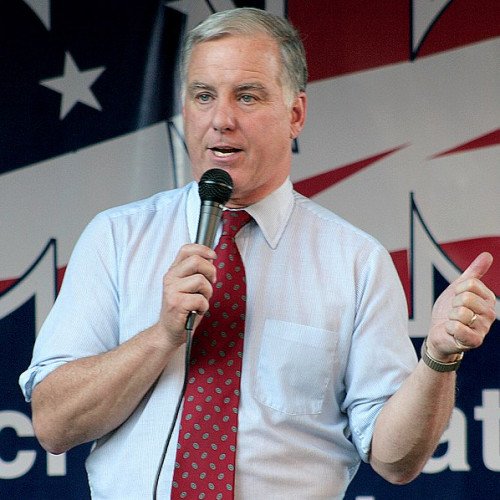Donald Rumsfeld VS Howard Dean

Donald Rumsfeld
Donald Henry Rumsfeld (born July 9, 1932) is a retired American politician. Rumsfeld served as Secretary of Defense from 1975 to 1977 under Gerald Ford, and again from January 2001 to December 2006 under George W. Bush. He is both the youngest and the second-oldest person to have served as Secretary of Defense. Additionally, Rumsfeld was a three-term U.S. Congressman from Illinois (1963–69), director of the Office of Economic Opportunity (1969–70), counsellor to the president (1969–73), the United States Permanent Representative to NATO (1973–74), and White House Chief of Staff (1974–75). Between his terms as Secretary of Defense, he served as the CEO and chairman of several companies. Born in Illinois, Rumsfeld attended Princeton University, graduating in 1954 with a degree in political science. After serving in the Navy for three years, he mounted a campaign for Congress in Illinois's 13th Congressional District, winning in 1962 at the age of 30. While in Congress, he was a leading co-sponsor of the Freedom of Information Act. Rumsfeld reluctantly accepted an appointment by President Richard Nixon to head the Office of Economic Opportunity in 1969; appointed counsellor by Nixon and entitled to Cabinet-level status, he would also head up the Economic Stabilization Program before being appointed ambassador to NATO. Called back to Washington in August 1974, Rumsfeld was appointed chief of staff by President Ford. Rumsfeld recruited a young one-time staffer of his, Dick Cheney, to succeed him when Ford nominated him to be Secretary of Defense in 1975. When Ford lost the 1976 election, Rumsfeld returned to private business and financial life, and was named president and CEO of the pharmaceutical corporation G. D. Searle & Company. He was later named CEO of General Instrument from 1990 to 1993 and chairman of Gilead Sciences from 1997 to 2001. Rumsfeld was appointed Secretary of Defense for a second time in January 2001 by President George W. Bush. As Secretary of Defense, Rumsfeld played a central role in the invasion of Afghanistan and invasion of Iraq. Before and during the Iraq War, he claimed that Iraq had an active weapons of mass destruction program; yet no stockpiles were ever found. A Pentagon Inspector General report found that Rumsfeld's top policy aide "developed, produced, and then disseminated alternative intelligence assessments on the Iraq and al Qaida relationship, which included some conclusions that were inconsistent with the consensus of the Intelligence Community, to senior decision-makers". Rumsfeld's tenure was controversial for its use of torture and the Abu Ghraib torture and prisoner abuse scandal. Rumsfeld gradually lost political support and he resigned in late 2006. In his retirement years, he published an autobiography Known and Unknown: A Memoir as well as Rumsfeld's Rules: Leadership Lessons in Business, Politics, War, and Life.
Statistics for this Xoptio

Howard Dean
Howard Brush Dean III (born November 17, 1948) is an American physician, author, and retired politician who served as Governor of Vermont from 1991 to 2003 and Chair of the Democratic National Committee (DNC) from 2005 to 2009. Dean was a candidate for the Democratic nomination in the 2004 presidential election. His implementation of the fifty-state strategy as head of the DNC is credited with the Democratic victories in the 2006 and 2008 elections. Afterward, he became a political commentator and consultant to McKenna Long & Aldridge, a law and lobbying firm. Before entering politics, Dean earned his medical degree from the Albert Einstein College of Medicine in 1978. Dean served as a member of the Vermont House of Representatives from 1983 to 1986 and as Lieutenant Governor of Vermont from 1987 to 1991. Both were part-time positions that enabled him to continue practicing medicine. In 1991, Dean became governor of Vermont when Richard A. Snelling died in office. Dean was subsequently elected to five two-year terms, serving from 1991 to 2003, making him the second longest-serving governor in Vermont history, after Thomas Chittenden (1778–1789 and 1790–1797). Dean served as chairman of the National Governors Association from 1994 to 1995; during his term, Vermont paid off much of its public debt and had a balanced budget 11 times, lowering income taxes twice. Dean also oversaw the expansion of the "Dr. Dynasaur" program, which ensures universal health care for children and pregnant women in the state. He is a noted staunch supporter of universal health care.Dean denounced the 2003 invasion of Iraq and called on Democrats to oppose the Bush administration. In the 2004 election, Dean was the top fundraiser and front runner, prior to the Iowa caucus, for the Democratic Party presidential nomination. Although he lost the nomination to Senator John Kerry of Massachusetts, Dean pioneered Internet-based fundraising and grassroots organizing, which is centered on mass appeal to small donors which is more cost efficient than the more expensive contacting of fewer potential larger donors, and promotes active participatory democracy among the general public. In 2004, Dean founded Democracy for America, a progressive political action committee. He was later elected chairman of the Democratic National Committee in February 2005. As chairman of the party, Dean created and employed the 50 State Strategy that attempted to make Democrats competitive in normally conservative states often dismissed in the past as "solid red". The success of the strategy became apparent after the 2006 midterm elections, where Democrats took back the House and picked up seats in the Senate from normally Republican states such as Missouri and Montana. In the 2008 presidential election, Barack Obama used the 50 state strategy as the backbone of his candidacy. Dean was named chairman emeritus of the DNC upon his retirement. Since retiring from the DNC chairman position, Dean has held neither elected office nor an official position in the Democratic Party and, as of 2015, was working for global law firm Dentons as part of the firm's public policy and regulation practice. In 2013, Dean expressed interest in running for the presidency in 2016, but instead supported former Secretary of State Hillary Clinton's run for president. Dean endorsed Clinton over her competitor Senator Bernie Sanders in spite of the fact that Sanders represented the state of Vermont, where Dean had been governor.